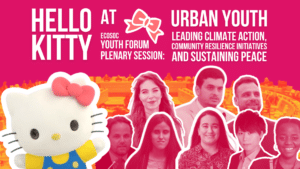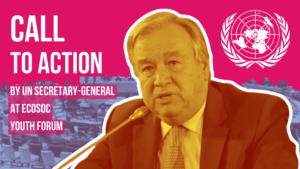
Written by: Olga Tsaplina
February 10, 2023. – What do a green bag, martial arts belt, worn-down shoes, and a COVID-era hand sanitizer have in common? And what do they have to do when it comes to planning our common urban future?
The year 2023 has begun for the young people focused on effecting change with a creative gather-round to contemplate the ways the cities of the future are imagined, planned and organized. The workshop’s methodology used an innovative action learning approach, drawing on the intersections of futures studies and anticipation with performance and drama techniques. The main assumption was that interactive, immersive and futures-oriented experiences have potential to empower young people to participate and co-design activities in matters generally associated with adults and expert knowledge.
The flyer promoting the workshop’s vision sets the tone:
The Cities’ Futures Workshop: Reimagining Resilient Cities & Intergenerational Dialogue is part of the United Nations, led by UNESCO, UNEP and UN-Habitat, drive to recognize youth’s role in foresight – “youth foresight” – the predicting and planning for the future.
began with the participants choosing an avatar from a series of objects scattered around the floor in one of Middlesex University’s theatre studios; these included a green bag, a martial arts belt, worn-down shoes, and a hand sanitizer, among others. This exercise, an essential part of the workshop, helped participants remove the perceived barriers of age, gender, experiences, and affiliations. Having picked the objects of their liking, the participating youth were asked to share their overall sentiments about how optimistic or pessimistic they feel about the future and whether they feel empowered to impact their own and the world’s future.
After discussing the state of the world today and the youth’s agency, the participants were engaged to co-create future cities they would like to live in. The young changemakers moved to breakout groups to co-design a city of the future, plan an excursion around its imaginary neighborhoods, come up with a story of conflict situation and a resolution (in good old theatre tradition!) and present their work in a quorum.

The workshop was an opportunity to participate in a process of social foresight, envisioning a future for cities globally. The organizers will use this workshop as a prototype testing for the development of similar activities and projects in the future for youth as well as for adults. The workshop was piloted by UNESCO and Middlesex University, London, and supported by the UNEP’s World Environmental Situation Room and Climate Changemaker Programme and UN-Habitat.
Youth Foresight, epitomized by initiatives like the Cities’ Futures Workshop, is an essential tool for navigating today’s ever-changing world. It involves anticipating and shaping the future, prioritizing young people’s perspectives and needs, transcending boundaries, and breaking barriers. This approach empowers both the United Nations and youth, enabling them to analyze trends, identify opportunities, and envision future scenarios. Youth Foresight bridges generational gaps, fostering dialogue and co-creation. Simultaneously, intergenerational equity, a UN cornerstone, aligns seamlessly with Youth Foresight’s principles, emphasizing our moral obligation to future generations. However, there’s concern about slow progress, calling for revitalized intergenerational solidarity, particularly in areas such as environmental protection. The UN plays a crucial role in advancing this cause, promoting a more inclusive, resilient, and sustainable world.




